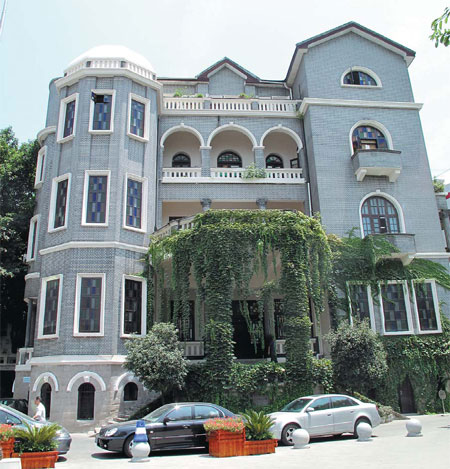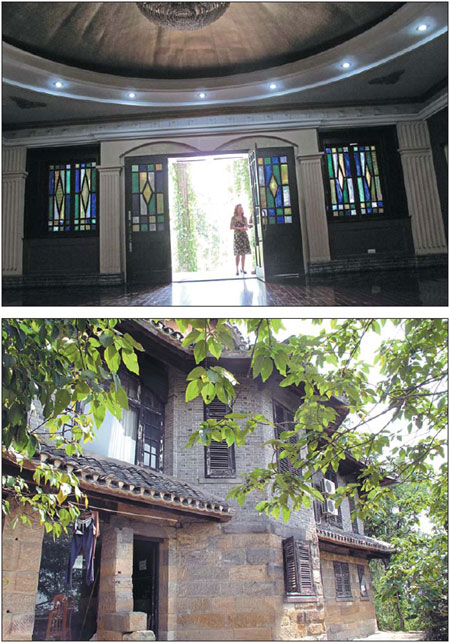..
Dust brushed off war heritage sites
Updated: 2014-01-22
By Luo Wangshu and Tan Yingzi, China Daily
|
The administrative office of the Third People's Hospital of Chongqing was once the embassy of the Soviet Union in the city. Photos by Luo Wangshu / China Daily |
|
Top: The hallway of the administrative office of the Third People's Hospital of Chongqing. Above: The former Germany embassy, which is now private real estate. |

Historical buildings serve as reminders of a crucial time in history, Luo Wangshu and Tan Yingzi report in Chongqing
Temperatures of 40 C were pushing the mercury to the top of the thermometer, heating up the old four-story building, which has a history as torrid as any scorching summer day.
The quiet house, ivy clinging to the walls and porch, is located on a hilltop in the southwestern municipality of Chongqing, the wartime capital of China. It now serves as the administrative center of the Third People's Hospital of Chongqing, but during World War II the plain building was the Soviet embassy.
"This building may have been the birthplace of many important decisions that shaped the world during the war, and it may also have hosted world leaders," said Wang Fumei, director of the hospital's cultural affairs office, who has worked in the building for nearly 30 years.
Many countries established diplomatic centers in Chongqing during wartime, playing a critical role in the Asian theater of war. However, the history of these sites was rarely mentioned until five years ago when people started to seek out and cherish wartime truths through Chongqing's living history.
The sites, which are mainly scattered around downtown districts such as Yuzhong and Nan'an, have changed their functions in the post-1945 world.
The former United States embassy became the administrative center and dining room of the Chongqing Emergency Medical Center. The British embassy, as was, is privately owned and has been leased to a resort company. What was once the Italian embassy, its walls cracked and crisscrossed by electric cabling, is home to six families. The former office of the Indian prefectural commissioner, located in the Nanshan Botanical Gardens, now serves as a public library.
In the aftermath of that global conflict, these sites fell into disrepair, their facades dilapidated and uncared for, the grounds overgrown and tangled with weeds.
Cultural heritage
Now though, these historic sites are finally getting the recognition they deserve. In July, 13 of Chongqing's wartime diplomatic centers were selected as National Archeological Sites, with the aim of better protecting and preserving China's cultural heritage.
In a 2010 proposal, Huang Jiren, a Chongqing writer and a member of the Chinese People's Political Consultative Conference, appealed to the State to protect Chongqing's wartime heritage.
The central government is now paying great attention to the preservation of the wartime heritage. Chongqing, home to many wartime treasures, is also on a mission to protect and preserve its heritage. An international conference themed "The War of Resistance against Japanese Aggression during World War II", will be held in Chongqing next month and a number of international authorities on the conflict will attend.
In the past two years, the Sino-Japanese relationship has become even more complicated because of the Diaoyu Islands issue, which has attracted greater global attention to the history of the war in China, said Zhou Yong, director of the Chongqing Research Center for War of Resistance against Japanese Aggression in the Unoccupied Area, which collates and protects historical materials relating to the period when parts of China were occupied.
"These embassy sites are reminders of a time - past, but not long past - when China was part of a global struggle against the forces of fascism and imperialism. China's war with Japan was part of a wider international conflict and the embassies remind us of that time," Rana Mitter, professor of the history and politics of modern China at Oxford University's Institute for Chinese Studies, wrote in an e-mail to China Daily.
When the Kuomintang government of Chiang Kai-shek established Chongqing as China's capital in 1937, the Soviet Union was the first country to hand in a request to set up an embassy in the wartime capital. The Soviet move was swiftly followed by similar requests from more than 30 countries.
However, these once glorious sites, awash with history, have become hospitals, libraries, museums and even private residences, serving the lives of ordinary people.
Wang, 50, began working as an administrative assistant at the site of the former Soviet embassy in 1982. Climbing the wooden stairs to her fourth-floor office is like taking a trip 75 years into the past, to a time when the building was full of diplomats and intrigue.
The four-story building, with 56 rooms spread over its 488.8 square meters of floor space, was used as a clinic and wards in the immediate postwar era.
"The rooms were not the same shape as regular hospital wards and so the building's function was changed and it became an administrative center," said Wang.
For Wan Xin, a 23-year-old member of the administrative staff, the building is her workplace, but it also holds happy memories from her childhood when she spent her days playing in the grounds.
"The ceilings are higher than those in other buildings," said Wan, whose mother has worked at the hospital since Wan was a child.
Although the facade has been altered slightly and the interior remodeled, the former Soviet embassy has generally been preserved well.
Sadly, the same can't be said for the former US embassy, situated just a five-minute drive away. The building was torn down in 2007 and is now being rebuilt in accordance with the original plans, but with upgraded materials and facilities.
Wu Yang, deputy director of the Chongqing Emergency Medical Center's general office, said the embassy will be restored to its original appearance.
A family home
Ding Huilong, a 73-year-old retired high school teacher, has closer ties with the old embassy sites than most people. Her family moved into the former Germany embassy, situated on Nanshan Mountain in the east of Chongqing, at the end of 1971 and stayed there for 21 years.
"My students loved coming to my home to use the library and practice their acting and singing," said Ding, recalling the old days. The former Chinese teacher added that the front yard of the house, which is now private property, served as a stage for her artistically inclined students.
One of her former pupils, Li Jia, often visits her old teacher. The middle-aged woman said she still likes to hike to the top of the hill to take a break and admire the stunning views of the Yangtze River far below.
"The house was fantastic for us teens, especially in the 1970s. The view from the balcony is great," said Li, who can clearly recall the layout of the building.
Ding keeps two snapshots of a tall blond-haired woman in her photo album. "She is the daughter of a German doctor, the original owner of my old home, the former Germany embassy," she said, before apologizing for her inability to recall the name of the woman, who visited the site in the late 1980s.
Ding doesn't speak German and the "German woman" didn't speak Chinese, but the visitor wrote her address on the backs of the photos and sent them to Ding's family in the hope of maintaining contact, however slight, with her Chinese friends in the pre-Internet age.
Although the handwriting is difficult to decipher, Ding and her husband covered the backs of the photos in clear tape to preserve the contact details.
Unbreakable links
The former Australian legation, whose visitors included its former prime minister Bob Hawke and his wife, is now the administrative office of E'ling Park, a large public space in Yuzhong district.
"The sites are links between Chongqing and the rest of the world," said Zhou from the research center. Zhou said the affection that exists between China and other countries was forged by history and the shared experience of difficult times.
Oxford University's Mitter said the sites are reminders of a crucial time in the history of the world. He said it's important for Chinese people to remember those times and remember that, along with the Chinese Communist Party and foreign allies, the Kuomintang government played a role in defeating the Japanese.
"It's important to preserve the historical sites in Chongqing, the places that recall its role as the wartime capital of China. The politics of the Cold War in China and the West led to this piece of history being forgotten. It is important to remember the role of Chiang Kai-shek along with that of Mao Zedong - and Chongqing was the capital where China's Kuomintang government resisted Japan, in alliance with the CPC," he wrote. Mitter suggested that former allies and enemies need to visit Chongqing and understand the importance of the city's role in resisting the invasion of China.
Zhou echoed Mitter's opinion. "The only way to gain permanent peace is to liquidate the historical debt thoroughly. One of the important reasons for China to preserve these wartime sites is to clear up the issues of history with Japan."
Zhou also believes that Chongqing witnessed the rise of modern China: "From the diplomatic point of view, China became a large, strong country, one of the four world superpowers, along with the United States, the United Kingdom and the Soviet Union. It was a difficult beginning in the process of building a strong country from a weak one." Huang Xiaodong, executive member of the Chongqing Historical Society, applauded the preservation of wartime sites.
"These sites make history manifest and they are reminders of a truly vivid past. Restoring the sites will create an atmosphere that will help people today understand that history vividly and thoroughly," he said.
Gao Hong, deputy director of the Institute of Japanese Studies at the Chinese Academy of Social Sciences, acknowledged that the wartime sites are an important element in developing the relationship between the two countries.
"We'll learn from history and face the future," Gao said, adding that a correct historical record is essential for an accurate understanding of the past.
"In addition to the written and broadcast media records, historical sites are an important part of the material evidence. They are reminders to the post-war generations not to forget the past," he said.
The last word goes to Wan Xin. For her, the experience of working in a building that played such a vital role in history is an uplifting one: "Whenever I step into the hallway, I feel proud of the rich and honorable history. Even the smell of the old wood is exciting. Maybe I'm being affected by the magic of history?"
Contact the writer at luowangshu@chinadaily.com.cn
(China Daily 08/15/2013 page6)
Video

UK trade commissioner for China praised Chongqing as a burgeoning center in intelligent manufacturing.







